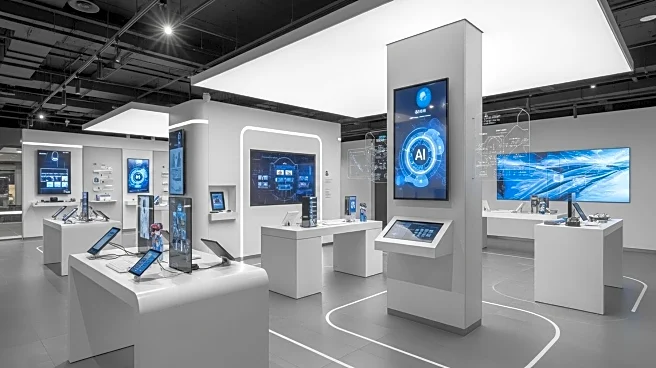What's Happening?
Melissa Gonzalez, a principal at MG2 and founder of the MG2 Advisory, emphasizes the importance of experiential and immersive design in physical retail spaces. Despite advancements in online shopping, consumers, particularly younger generations, continue to prefer shopping in physical stores. Gonzalez highlights the 'experience economy' and the need for retailers to create unique, engaging shopping experiences that cannot be replicated online. She discusses strategies for transforming retail spaces into strategic assets, including interdepartmental communication, modularity in store design, and co-creation with consumers. Gonzalez also explores the motivations and behaviors of Gen Z, noting significant differences within the cohort and the importance of sustainability values in brand opportunities.
Why It's Important?
The insights shared by Melissa Gonzalez are crucial for retailers aiming to capture consumer interest in an increasingly digital world. As AI continues to enhance online shopping experiences, physical stores must offer something unique to attract customers. Gonzalez's emphasis on experiential design and strategic asset transformation provides a roadmap for retailers to differentiate themselves and capitalize on the 'experience economy.' Understanding Gen Z's motivations and behaviors is vital for brands targeting this demographic, as they represent a significant portion of the consumer market. Additionally, the focus on sustainability values offers brands an opportunity to align with consumer ideals, potentially increasing brand loyalty and sales.
What's Next?
Retailers are likely to explore innovative ways to enhance the in-store experience, incorporating elements of surprise and delight to attract consumers. As the holiday season approaches, these strategies could be pivotal in driving foot traffic and sales. Retailers may also invest in research to better understand Gen Z and Gen Alpha, tailoring their offerings to meet the needs and preferences of these groups. The integration of AI in retail could further evolve, with physical stores finding new ways to complement digital advancements. Brands may also focus on sustainability initiatives, leveraging consumer values to strengthen their market position.
Beyond the Headlines
The shift towards experiential retail spaces highlights broader cultural trends, including the desire for meaningful, memorable experiences over material goods. This trend may influence other sectors, such as travel and hospitality, as consumers seek out unique experiences. The emphasis on sustainability reflects growing consumer awareness and demand for ethical practices, potentially driving long-term changes in corporate strategies. As Gen Z and Gen Alpha continue to shape consumer markets, brands may need to adapt their approaches, focusing on authenticity and transparency to build trust and engagement.












